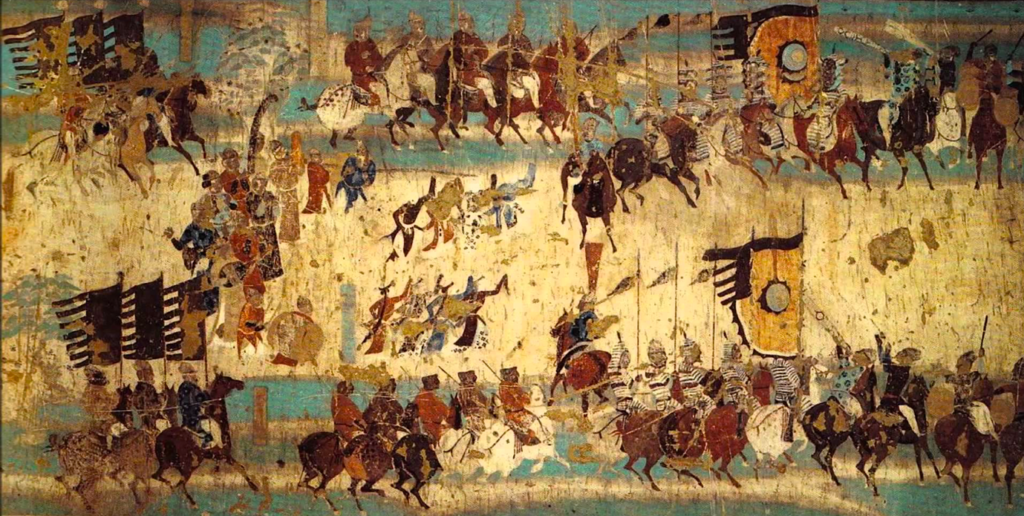
Life has seldom been easy for the Uyghur people, either historically or in the present day. China’s notorious treatment of them in modern times has led to sanctions by other countries and a lot of criticism, although China denies doing anything wrong, of course. It sees the treatment of the Uyghurs as “an internal matter” in which other countries have no right to criticise or interfere. But slave labour and genocide have never counted as “an internal matter” and nor can they now. Once upon a time the Uyghurs, originally a nomadic Turkic people, were valuable horse soldiers, employed in defence of the Tang dynasty. The Uyghurs also annoyed the Tang by insisting on receiving silk and other goods in exchange for the horses. The Tang, apparently, didn’t even want the horses but it’s hard to say ‘no’ to a man with a big spear and a powerful bow strung across his back. So it was that the Uyghurs and the Tang eked out an uneasy trading relationship in the 7th and 8th centuries. The (relatively) peaceful relationship was underwritten by the brilliant female emperor, Wu Zetian, who must go down in Chinese history as one of the Country’s greatest-ever leaders, not to mention one of its cleverest. By the time this happened, the Uyghurs were recognised as the inhabitants of what is now Mongolia, although their arrival largely coincided with that of other Turkic groups, such as the Kyrgyz and the Khitan, then later the Jurchen, Mongol and Manchu.
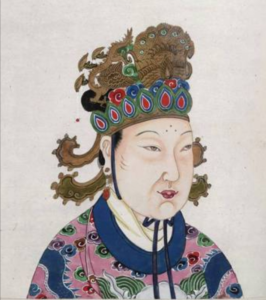
Apart from trying to sell the Tang horses they didn’t want, they did help to retake the city of Luoyang from Shi Chaoyi, the final emperor of the Yan state that rebelled against the Tang Chinese. They were good fighters and useful enough for the Tang not to get too upset over the superfluity of unwanted horses. The Xinjiang Uyghur Autonomous Region (XUAR), to give it is complete name, is an area of 1.6 million square kilometres on the north-west frontier of China. It is bordered by China, of course, and by Mongolia to the north-east, Kazakhstan to its north-west, Kyrgyzstan, Tajikistan, Russia, Kashmir, India, and Pakistan. Its current main inhabitants are the Uyghurs, who inhabited Tarim Basin, now a desert but at one point a small sea (or large lake). It’s where the famous mummies were found. It’s what known to geographers as an endorheic basin, which has limited drainage and so retains water because there’s nowhere for it to go, mainly creating seasonal swamps which eventually evaporate.
The Uyghurs were not Muslims at the time. The Uyghurs themselves believe that they are of both Caucasian and East Asian descent. They think that the amazing Tarim mummies, which look so human that one could almost imagine them getting up and walking away (although you’d get a shock if they did) and which are quite unlike the mummies of ancient Egypt, are ample proof of the Uyghurs’ right to the Xinjiang region. One of the mummies, known as the Beauty of Loulan, even inspired a power ballad in 2013 from the popular 26-year-old Chinese singer, Yan Duo, on an album she recorded.
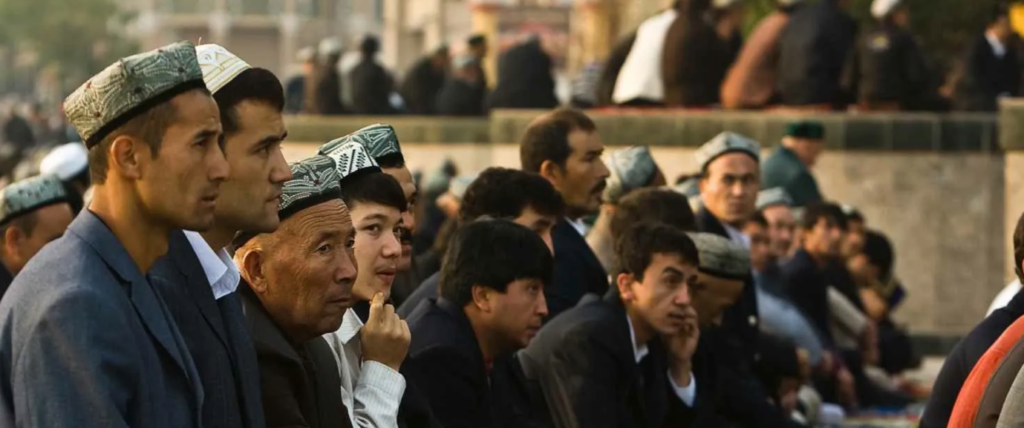
The Uyghurs began as Buddhists and their adoption of Islam started slowly in the 10th century. In fact, it was probably the Sogdian refugees, survivors of an ancient civilisation fleeing subjugation at the hands of Arabs, who converted the Uyghurs, initially to the strange hybrid religion of Manichaeism, which began in Persia in the 3rd century CE by a man called Mani, known to his followers as the “Apostle of Light”. Manichaeism is an odd mixture, sometimes described as a Christian heresy, although it contains traces of Buddhism, Judaism, Zoroastrianism and other dualist faiths. Even a young Emperor Augustine was a follower at one point. Severe repression by the Muslim Abbasid caliphate changed that and Islam became (gradually) the reigning faith. Among the Uyghurs, of course, it still is.
In fact, resistance to incoming “foreign” faiths, such as Manichaeism, was so strong that any Sogdian preachers caught proselytising in the Xinjiang streets were regularly beaten, tortured or even murdered. Even so, by the 16th century most Uyghurs would identify as Muslims. The current Chinese government insists that the Uyghurs were captured by Muslims, enslaved and ‘forced’ to convert but there is very little evidence for this; like so much that politicians of all nationalities say these days, it seems not to be actually true. In fact, it’s also been claimed that the Tang never paid for many of the horses the Uyghurs brought to them, and so they remain an unpaid debt. Understandably, the Tang kept trying to negotiate lower prices for these horses they didn’t actually need, nor want, although other sources claim that the trade continued for a century, with the Chinese emperor sending the Uyghur Kagan (or emperor) up to 500,000 pieces of silk every year, which doesn’t sound like something anyone would do if they were really fed up with receiving horses in return. Later, the Uyghurs accepted tea instead. It’s thought by some experts that the Uyghurs were developing a prosperous urban class in which silk, horses and tea became a kind of trading currency, while Karabalghasun, the Uyghur capital at that time, became considerably larger and much richer than it had been when it was founded in 744. If the Uyghur and the Tang got on reasonably well back then (admittedly not all the time – there were some serious fallings-out, too), what has so poisoned the relationship in more modern times?
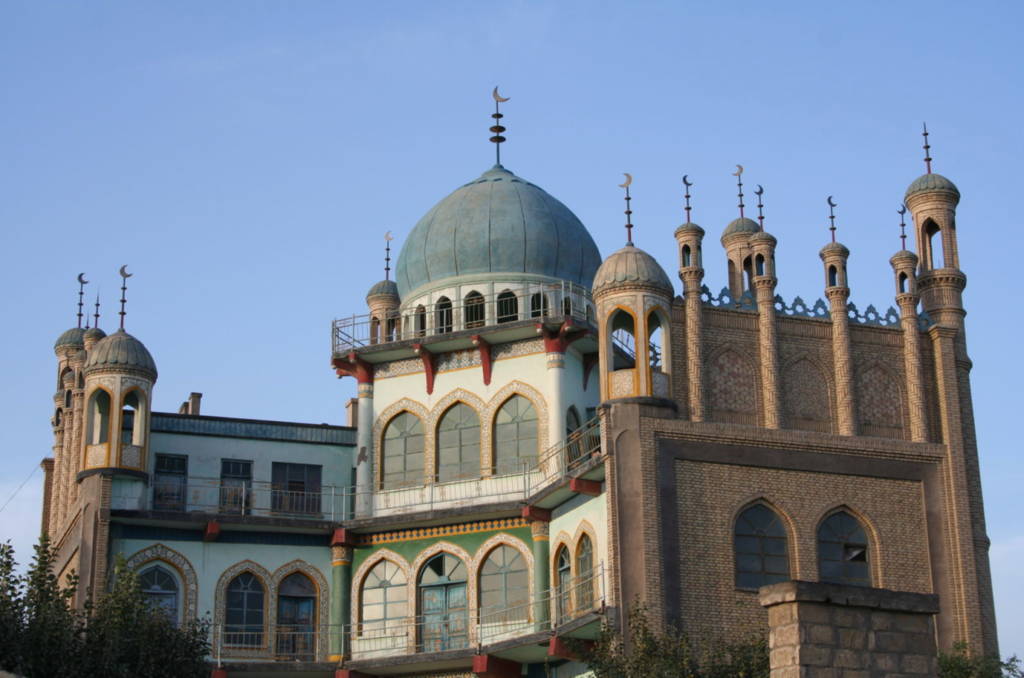
FORGET THE TRUTH, WE’LL INVENT A NEW ONE
Today, the CCP denies everyone the right to question what they regard as their internal issues. In any case, Xinjiang, the name by which the Uyghur territory is known in China, means “new territories” or “new border” in Chinese; most Uyghurs prefer to call their land ‘East Turkistan’. Dulkan Isa, President of the World Uyghur Congress and Vice President of the Unrepresented Nations and Peoples Organisation was roughly expelled from a public event at the United Nations in New York because he asked a question. The UN security people appear to have acted on behalf of the CCP in silencing a potential opponent. The next time Isa applied for accreditation to the UN it was refused, and only intense lobbying by the German, EU, and American representatives succeeded in restoring it. Isa says that afterwards, Chinese officials followed him and took seats beside him in the hopes of intimidating him.
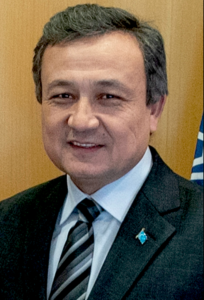
He claims they also wrote to the security services of the European Parliament, claiming he was a terrorist and should be denied access to speak to MEPs. It didn’t work in the European Parliament’s case, but the sort of mindless collaboration the Chinese seek – and obtained at the UN from American security people – is a gift to the CCP and helps to promulgate their false narrative about the Uyghur people. And it is a false narrative; just as they claim to be saving the Uyghurs after their allegedly ‘forced conversion’ to Islam, they now claim that the Chinese ‘re-education camps’ are to help the Uyghurs assimilate better into Chinese society. The thing we in the West are inclined to forget is that by seizing control over Uyghur land, China is also gaining control of the vast reserves of petroleum, coal, and uranium that can be exploited there. But first, truth must be eliminated.
“There’s a massive on-line network of trolls, bots, automated accounts, but also real people,” award-winning British journalist Isobel Cockerell told a press conference organised by Index on Censorship. “There are thousands and thousands of these accounts that are sort of programmed to undermine the Uyghur story, the Uyghur narrative, and I think it goes beyond disinformation in many cases.” It would seem, in fact, that the agents of the CCP are not just trying to erase the Uyghurs’ real story but that they are keen to replace it with fiction. In Thomas Pynchon’s novel, ‘Mason and Dixon’, about the British surveyors who ran the boundary line between Pennsylvania and Maryland in the late 18th century that is still known as the Mason-Dixon line, there is a Chinese character who says: “To rule forever, it is necessary only to create, among the people one would rule, what we call ‘Bad History’.” The novel is, in the main, a work of fiction (and my favourite book, incidentally), but that particular quote seems oddly true and somewhat pertinent in this case. Cockerell also mentions “extreme left outlets” that apparently dismiss the Uyghur claims as “conspiracy theories” about what’s happening in Xinjiang. It comes down to “a denial of everything that’s going on there, a denial that there are concentration camps, a denial that there is forced labour there; a denial that there is anything at all wrong,” she continued, that the offending websites try to portray Xinjiang as a happy place, and thatif only you visited it you would see for yourself. The Chinese authorities, however, keep the tourists away, especially journalists, or at least under strict control, while the resources being pumped into this programme are, Cockerell said, “absolutely enormous, and relentless as well.”
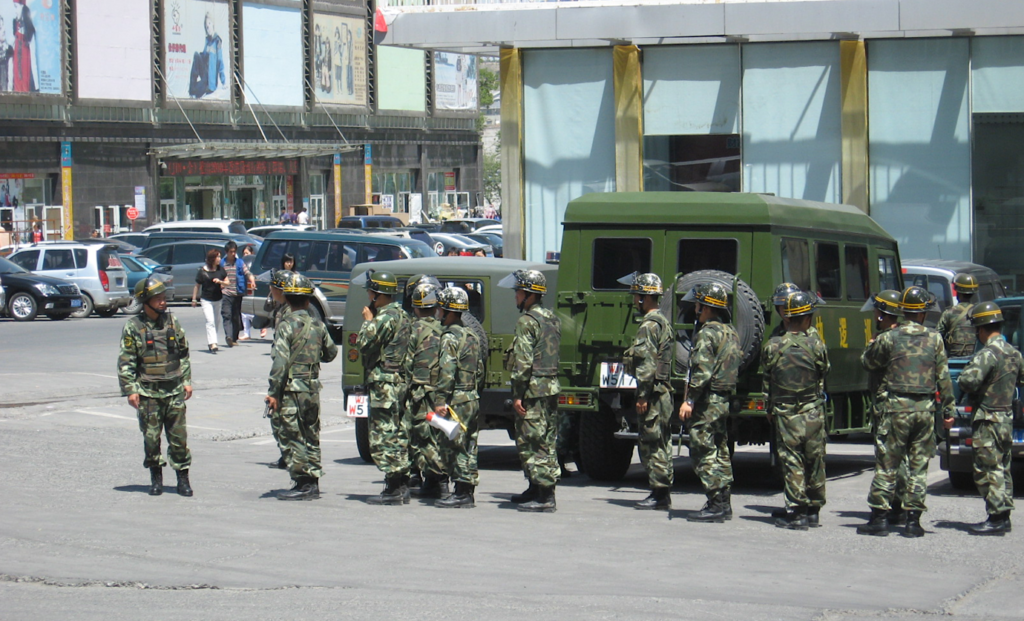
It’s the false narrative that is, perhaps, most interesting, and most dangerous. World leaders are well aware that Beijing tells lies, but sometimes it is less troublesome and more convenient to believe the lies (or at least to say you do) and set aside one’s doubts, even if only in public. “When I was growing up, at school there was no chance to learn Uyghur history, only China’s history,” Dolkun Isa told the press conference, “Uyghur history is a part of China’s history since ancient, ancient, ancient times, and all the time China claims that Uyghurs are part of China since ancient times.” Back in the late 7th century, Tang Empress Wu Zetian clearly didn’t think so; the Uyghurs were useful soldiers who helped to protect the dynasty (even if they did try to sell her horses). Incidentally, the expression “flogging a dead horse” means continuing to work at something that is completely pointless; these days it is the Uyghurs themselves that get – quite literally – flogged.
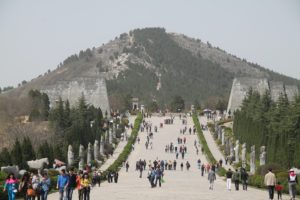
The Uyghurs did fall out of favour with the Tang because of ill will over the terms of terms of a coalition between the Tang and the Uyghur khaganate, which perhaps suggests a long-term festering dislike between the Uyghurs and the Han Chinese, especially after the Manichean regional leader Bügü Khagan was murdered by his ambitious and disloyal cousin, Tu Baga Tarquan, who, unlike Bügü, encouraged xenophobia. The CCP seems to continue to believe that flogging the Uyghurs themselves may quieten dissent. The Tang dynasty period of China’s and Xinjian’s history run parallel and are really interesting, too. “If you look at China’s history seriously,” Isa said, “not the version told by the Uyghurs, in China’s version it is completely changed, and you can see new things.” In other words, carefully constructed fiction. Isa went on to warn that quite a lot of respectable historians, “historians who know the Uyghur story well”, including Russians, have been denied visas, at least if they have expressed an interest in researching the Uyghurs. Only the history dreamed up by CCP propagandists is acceptable; anything else (such as the truth) is vehemently denied. The CCP seem determined to follow the dictum of Winston Churchill, who wrote: ““History will be kind to me for I intend to write it.” And somewhat unfairly, it has been. “If you don’t know history,” wrote author Michael Crichton, “then you don’t know anything. You are a leaf that doesn’t know it is part of a tree.” It would seem that the Uyghurs, by and large, do know; it’s just that the CCP keeps trying to chop down the tree.
Uyghurs who have left China and started new lives elsewhere are not immune to the pressure exerted by the CCP to ensure that Beijing’s narrative is the only one seen or known.

“What matters to China is business, reputation and the access to slave labour,” said English Conservative MP Nus Ghani, who was sanctioned by China because she was instrumental in writing the UK’s flagship Trade Bill, aiming to prevent the British government from giving preferential trade deals to countries guilty of committing genocide. She led a campaign which resulted in the UK parliament unanimously agreeing that the current situation in Xinjiang is quite adequate proof that China is guilty of genocide. She has spoken at a wide range of events on the situation in Xinjiang and the rest of China and is an active member of the Inter-Parliamentary Alliance on China. She is also keen to halt the harvesting of data. It was for exposing China’s use of slave labour and its harvesting of British consumers’ data that Beijing sanctioned her. “We know that the Chinese Communist Party wants to be legitimised at international institutions,” she told the Index on Censorship press conference, “the fact that there are a number of us that now hold positions, whether it’s the UK Parliament, myself on the Select Committee, and I’m also a member of the NATO Parliamentary Assembly, what I have done, and will continue to do, is to raise the plight of the Uyghur people, whether it’s security…you know, how are we going to reach net zero if we’re going to continue buying products that are made in Xinjiang? How can we say we’re going to deal with human rights, or women’s rights? There is no other place on Earth where more women are being abused at any one time; it is the Uyghur women.” As Ghani told the House of Commons: ““I will not be intimidated or silenced by these Chinese Communist Party sanctions and neither must our Government. It is a sign of weakness that, rather than allowing the UN full access to Xinjiang, the Chinese Government has resorted to sanctions.” The sanctions, against Ghani and several others include a ban on travelling to China or to Kong Kong and also a ban on Chinese citizens doing business with them. It is highly unlikely to have any effect, other than to annoy people. Not that the CCP sees things that way; it still appears to believe that with enough bullying any criticism can be swept aside. Ghani reminded MPs: “This is a wake-up call for all democratic countries and lawmakers that we will not be able to conduct our day-to-day business without China sanctioning us for exposing what’s happening in Xinjiang.”
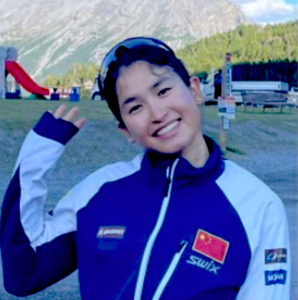
The Chinese organisers of the Beijing Winter Olympics made much of their choice of a Uyghur athlete, Dinigeer Yilamujiang, from Altay in Xinjiang to carry an Olympic torch into the arena, but Dolkun Isa dismissed it as “window dressing”. Nus Ghani flagged up the absence of diplomatic attendance to legitimise the competition. “There is no diplomatic presence from the British,” she said, “there is no diplomatic presence from the Americans and many other countries, that is a shameful exposé of the Chinese Communist party that many countries have refused to allow a diplomatic presence, and that is what matters to the Chinese Communist Party.”
WE KNOW WHERE YOU LIVE…
Isobel Cockerell recalled how a tribunal of Uyghur people held in London had attracted interference on a huge scale by the CCP. “I reported on the massive efforts that they used to try to undermine and to discredit the proceedings,” she told the press conference. “This was a people’s independent tribunal, and I think that most of the witnesses – plenty that I spoke to – the judges, people who were working on the administrative side – were all targeted by the CCP in some way. Someone at the tribunal showed me their phone and all their social media accounts with notification after notification on Signals, Telegram, Face Book, What’s Ap. Some of them faced continuing sign-in attempts. They were being brute force attacked by Chinese operatives to see what was happening at the tribunal, trying to get intelligence about the feelings, so absolutely they care!” The attempts didn’t end there, either. “There have been massive attempts to penetrate the World Leaders Congress and the work that they do,” Cockerell said.
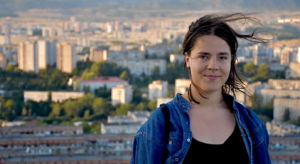
“The way that they (the CCP) send agents to Germany, the way they try to get in, the way they try to see what’s going on. And so yes, there are huge attempts to undermine all aspects of Uyghur access.” Sadly, a number of Uyghurs now living in Europe (and elsewhere) have stopped answering telephone calls and emails from China, fearing what they may contain and despite being eager to talk to loved ones back home.
It’s hard to tell the truth, according to Dolkun Isa, because if any historian, however senior he or she may be, tries to write what’s really happening they are then denied a visa, and this loss of access leaves people afraid to write what they know. Some Uyghurs in the diaspora report receiving a lot of messages and telephone calls, often from numbers they recognise as a relative’s, but when they answer, the person who speaks identifies himself as an official of the CCP and points out that they are in the house of a parent or other close relative, so they obviously know where they live, and they go on to talk about their children, or their nieces and nephews, and how important it is for them to remain at their school, with the clear implication that the situation is not guaranteed to continue if the person being called should say anything negative about things back in Xinjiang.
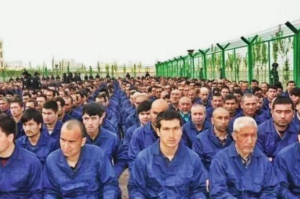
Concentration camps? What concentration camps? Forced labour? Never heard of it. These sorts of techniques, perfected by the Mafia and other Chicago gangsters in the first half of the 20th century, are just as effective today. One Uyghur woman who preferred to remain anonymous told a representative of the foreign media: “Not speaking out causes guilt; but speaking out causes fear.” It would seem that the CCP has started to practise gangsterism, determined to preserve their lucrative area of activity at any cost. Al Capone would have understood and probably applauded (as long as he got a cut). Oddly, another reason put forward for the development of anti-Uyghur sentiment in 8th century China is the fact that the Uyghurs practised usury, possibly at rather exorbitant rates, and expected to be repaid.
Which brings us to Russia. Xi Jinping and Vladimir Putin have met to talk about collaboration but both sides are considering it for different reasons and working together more closely may help neither of them. Russia fears damaging sanctions in the build-up to confrontation with the West over Ukraine; China fears further retaliation over its treatment of the Uyghurs and it use of slave labour in creating goods for export. It would seem that a picnic involving a bear and a giant panda would not be a happy get-together. For the Uyghurs, whatever China says or does won’t erase memories of their place of origin. The poet, writer and academic Aziz Isa Elkun, a long-time resident of London and now in the Sardinian city of Cagliari, says he still feels strong ties with his original homeland in north-west China, Xinjiang, or as many Uyghurs prefer to call it, East Turkistan.
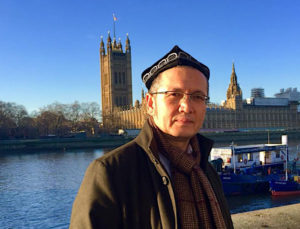
He has written a poem about how he misses his old home, which can be found on the website of Index on Censorship. Coincidentally, Index on Censorship was created half a century ago to give a voice to Soviet dissidents whose views were being suppressed by Moscow.
WHEREVER YOU GO, WE FOLLOW…
It’s common knowledge that the Uyghurs face tough times in China, and campaigners in the West are trying to prevent those who have got away and now live abroad from being deported back there. The Uyghurs may be getting the headlines because of China’s inhumane treatment of them, but they are not the only Turkic people to suffer. Others who share languages of the Altaic group include Kazakhs, Kyrgyz, Uzbeks and a lot of others you may never have heard of (I hadn’t). The US Congressional Executive Commission on China is especially strong on the issue, accusing Morocco, Saudi Arabia and Kazakhstan of seeking to send its Uyghur residents back to the People’s Republic, where they can expect some form of retribution. The Executive Commission has written to Secretary of State Anthony Blinken, asking him to intervene to stop the deportations of Turkic Muslims back to a land where, it’s claimed, they face the confiscation of their Qur’ans and their prayer mats, at the very least. While atheism is a perfectly legitimate belief (or lack of belief) to hold, the CCP wants to stop those who observe any sort of faith from practising it. The European Parliament, in a resolution condemned by the CCP, pointed up Article 36 of the Constitution of the People’s Republic of China, which “guarantees all citizens the right to freedom of religious belief” and also to Article 4, which “upholds the rights of minority ethnicities”.

We shouldn’t forget that the CCP is just as savage in its treatment of non-Turkic Chinese. Journalist Zhang Zhan is not expected to survive until spring unless she is released from her 4-year prison sentence, imposed for reporting on the coronavirus outbreak in China. A former lawyer, Zhang was detained for making on-line reports about the spread of the virus. She is on hunger strike but has been force-fed and has to wear shackles at all times. She is not the only journalist to suffer because the CCP believes that only it has the right to report on China through its (untrue) propaganda. Zhang has had her hands restrained, it’s claimed, 24 hours a day for three months, despite the efforts of Amnesty International. Disagreements between oppressor and oppressed seldom end well for either side: “Freeman and slave, patrician and plebeian, lord and serf, guild-master and journeyman, in a word oppressor and oppressed, stood in constant opposition to one another, carried on an uninterrupted, now hidden, now open fight, a fight that each time ended, either in a revolutionary re-constitution of society at large, or in the common ruin of the contending classes.” Surely the CCP cannot object to that quote: it comes from The Communist Manifesto, by Karl Marx and Friedrich Engels, who would not have like forced labour.
But while China’s Communist leaders would like to restrict the ability of the Uyghurs to reproduce, as well as seeking to exterminate their religion completely in Xinjiang, supposedly to prevent terrorism, they are now so attached to capitalism that they are prepared to use forced labour to win and retain contracts overseas. They are being assisted in this endeavour by foreign corporations turning a blind eye to issues with their supply chains, despite laws insisting that they must not. One must assume that for their boards of directors, the bottom line is of much greater importance than the abuse of the workers’ human rights. It involves a lot of workers, too, according to a European Parliament report. “According to credible reports,” it says, “more than one million people are, or have been, detained in what are being called ‘political re-education’ centres, in the largest mass incarceration of an ethnic minority population in the world today.”
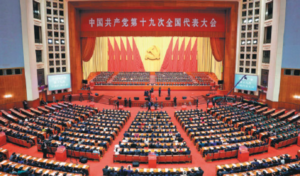
As for religious freedom, despite Articles 4 and 36, “credible reports have revealed the deliberate and systematic destruction of mosques, churches and other places of worship, mostly since 2017, reducing their numbers to the lowest level since the Cultural Revolution.” The Parliament also notes a March 2020 report from the respected Asia Society Policy Institute (ASPI – but be careful if you looks them up; the same initials are used for a number of very different bodies), “which identified 27 factories in nine Chinese provinces that are using the labour of at least 80,000 Uyghurs transferred from Xinjiang between 2017 and 2019; whereas these factories supply at least 82 global brands, including those owned by many European multinational companies.” The report “calls on the Chinese authorities to cease government-sponsored programmes of forced labour and mass sterilisation.” It also “strongly condemns the extensive use of digital surveillance technologies to monitor and control the population in Xinjiang.”
If you’re a European living in Europe, don’t cheer up too soon; the manufacturer has sold the system to Western countries, too, as well as to repressive regimes around the world. The equipment can identify Uyghur nationals by facial recognition, which has led to harassment and to pressure being put on Uyghurs living in Europe and elsewhere to either return to Xinjiang or else to serve as informants against other Uyghurs, with the pressure by the CCP being applied: “sometimes by detaining family members”.
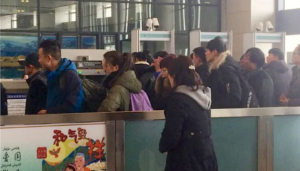
The EU is very concerned by China’s “comprehensive supervision” of Xinjiang through the “installation of Skynet electronic surveillance in major urban area, GPS trackers in all motor vehicles, the use of facial recognition scanners at checkpoints and at train and petrol stations, using software based on artificial intelligence camera systems aimed at identifying Uyghurs and other members of ethnic minority groups, and the blood collection campaign by Xinjiang police in order to further expand China’s DNA database.” It makes the CCP sound more like Count Dracula than defenders of the peace.
One Chinese company engaged in the surveillance business may suffer lost orders, over an issue that flags up the EU’s own lack of care over the supply chain, because the report “criticises the procurement of thermal cameras from Hikivision by Parliament’s administration and by the Commission; insists on the introduction of a circumspect procurement policy that takes human rights concerns duly into account.” It also urges “its President to immediately sever any direct or indirect business relationship with Hikivision, and to improve the transparency of its procurement activities.” It’s no good telling others not to do something, after all, if you do it yourself.
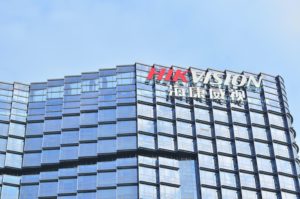
This whole issue is being taken very seriously by the US Department of State, which wants to put an end to forced labour. From a social perspective, it is cruel and dehumanising. From a purely capitalist perspective, it distorts competition. It’s hard to compete with a country whose workers are neither paid nor adequately fed and housed. “Over the last four years,” it explains, “the People’s Republic of China (PRC) has carried out a mass detention and political indoctrination campaign against Uyghurs, who are predominantly Muslim, and members of other ethnic and religious minority groups in the Xinjiang Uyghur Autonomous Region (Xinjiang), a large region in western China.” The on-line article goes on: “The courageous voices of survivors, their family members abroad, researchers, and international advocacy groups have thoroughly documented the PRC’s discriminatory use of surveillance technologies and trumped-up administrative and criminal charges to abduct and detain more than one million Muslims, including Uyghurs, ethnic Hui, ethnic Kazakhs, ethnic Kyrgyz, ethnic Tajiks, and ethnic Uzbeks, in as many as 1,200 state-run internment camps throughout Xinjiang. Detention in these camps is intended to erase ethnic and religious identities under the pretext of “vocational training.”
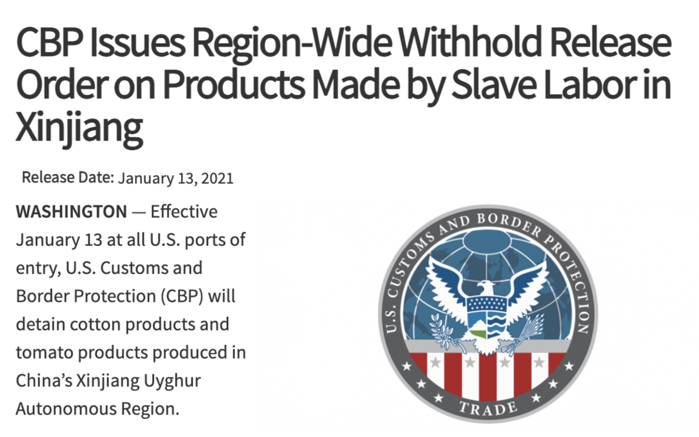
According to the US State Department, “The PRC initially denied all allegations, dismissing them as international “interference” in its domestic affairs. Confronted, however, with eyewitness testimony and thoroughly researched reporting from multiple sources, the PRC eventually admitted the existence of the camps. PRC officials then defended the facilities as necessary measures to counter “terrorism,” while also claiming that many of them had already been closed.” This, like many of the claims emanating from Beijing, was a lie. In fact, the number of camps has risen. There has been action to counter China’s measures to both use and abuse the Uyghurs. In the United States, for example, the Departments of State, the Treasury, Commerce and Homeland Security have released the ‘Xinjiang Supply Chain Business Advisory to alert businesses to the risks to their reputation – and to their profits – if they get involved with Xinjiang, issuing ten ‘Withhold Release Orders’ against goods and companies linked to forced labour practices.
According to a report in Al Jazeera, “China continues to carry out discriminatory work policies, such as forced labour, impossible production expectations and long working hours, against the Uighurs in its northwest province of Xinjiang, a United Nations committee said on Friday, urging Beijing to bring its employment practices in line with global standards.
The report from the International Labour Organization stressed that China has violated various articles of the Employment Policy Convention of 1964, which Beijing ratified in 1997, including the right to freely choose employment.” The International Trades Union Confederation is vehement in its condemnation of China’s practices, reports Al Jazeera: “Some 13 million members of the ethnic and religious minorities in Xinjiang are targeted based on their ethnicity and religion, the ITUC said, adding that Beijing justified its methods as ‘poverty alleviation’, ‘vocational training’, ‘re-education through labour’ and ‘de-extremification’,” a word that they seem to have made up; it’s not in any dictionary. China insists that the workers are paid and have “freedom”.

Ordinary working people – poor working people with families to feed and no income – took action against slavery in the Confederate states during the American Civil War, risking starvation to do so and winning the praise of US President Abraham Lincoln, whose statue now stands close to the Manchester Free Trade Hall, because despite closed mills and evictions, Lancashire’s cotton workers took a stand against slavery. “I cannot but regard your decisive utterances,” Lincoln wrote in 1863, “on the question as an instance of sublime Christian heroism which has not been surpassed in any age or in any country.” The workers wanted Lincoln to continue his blockade of the ports shipping slave-grown cotton to Lancashire. He did, and the Confederacy was defeated, of course, despite meetings organised by mill-owners urging the British government to take military action on the Confederacy’s side. They didn’t. Slavery has never been an “internal matter”, as China insists. It also now looks as if a Chinese-designed nuclear reactor will not be built in England. The politics of Chinese investment in the UK has changed and few feel inclined to risk putting Beijing in such a powerful position with its revolutionary reactor design. Cancelling the project will cost the UK government millions, but Prime Minister Boris Johnson told the House of Commons that he would block “undue influence by potentially adversarial countries”. Would today’s workers take a stand against slavery in Xinjiang? Only time will tell.

